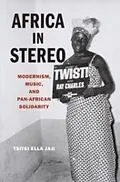Africa in Stereo analyzes how Africans have engaged with African American music and its representations in the long twentieth century (1890-2011) to offer a new cultural history attesting to pan-Africanism's ongoing and open theoretical potential. Tsitsi Jaji argues that African American popular music appealed to continental Africans as a unit of cultural prestige, a site of pleasure, and most importantly, an expressive form already encoded with strategies of creative resistance to racial hegemony. Ghana, Senegal and South Africa are considered as three distinctive sites where longstanding pan-African political and cultural affiliations gave expression to transnational black solidarity. The book shows how such transnational ties fostered what Jaji terms "stereomodernism." Attending to the specificity of various media through which music was transmitted and interpreted-poetry, novels, films, recordings, festivals, live performances and websites-stereomodernism accounts for the role of cultural practice in the emergence of solidarity, tapping music's capacity to refresh our understanding of twentieth-century black transnational ties.
Autorentext
Tsitsi Ella Jaji is Assistant Professor of English at the University of Pennsylvania.
Inhalt
Table of Contents 1. Stereomodernism: Amplifying the Black Atlantic 2. Sight-Reading: Early Black South African Transcriptions of Freedom 3. Négritude Musicology: Poetry, Performance, and Statecraft in Senegal 4. What Women Want: Selling Hi-Fi in Consumer Magazines and Film 5. "Soul to Soul": Echolocating Histories of Slavery and Freedom from Ghana 6. Pirates Choice: Hacking into (Post-)Pan-African Futures Epilogue: Singing Stones Bibliography Notes
